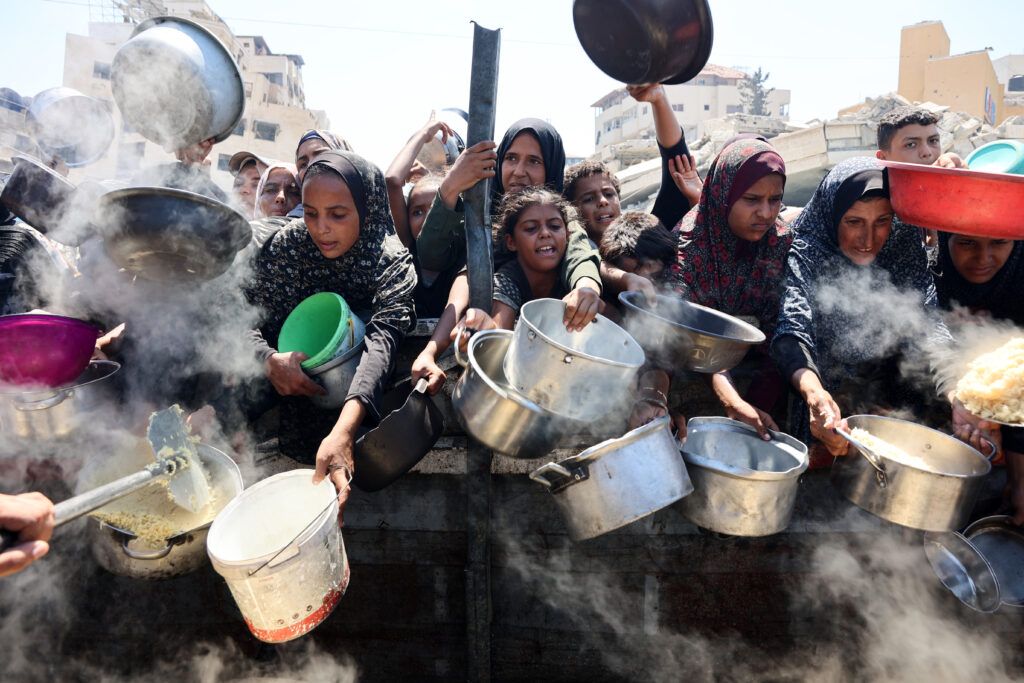AFP Asia Business
‘Far too late’: Palestinians despair after UN declares famine in Gaza
Desperate Palestinians clutching pots and plastic buckets scrambled for rice at a charity kitchen in Gaza City on Saturday, a day after the United Nations declared a famine in the war-battered territory.AFP footage from Gaza’s largest city, which Israel plans to seize as part of an expanded military offensive, showed women and young children among the chaotic jostle of dozens clamouring and shouting for food.One young boy used his hands to scrape a few leftover grains from the inside of a cooking vat. Another young girl sat on the edge of a tent and scooped rice from a plastic bag on the ground. “We have no home left, no food, no income… so we are forced to turn to charity kitchens, but they do not satisfy our hunger,” said Yousef Hamad, 58, who was displaced from the northern city of Beit Hanoun.Further south at a charity kitchen in Deir el-Balah, 34-year-old Umm Mohammad said the UN’s declaration of a famine had come “far too late”.The children are “staggering from dizziness, unable to wake up because of the lack of food and water,” she said.The UN officially declared a famine in Gaza on Friday, blaming the “systematic obstruction” of aid by Israel during more than 22 months of war.The Rome-based Integrated Food Security Phase Classification Initiative (IPC) said famine was affecting 500,000 people in Gaza governorate, which covers about a fifth of the Palestinian territory including Gaza City.- ‘Moral duty’ -Israeli Prime Minister Benjamin Netanyahu rejected the report as “an outright lie”.On Saturday, the head of the UN agency for Palestinian refugees said it was “time for the government of Israel to stop denying the famine it has created in Gaza”.”All of those who have influence must use it with determination & a sense of moral duty,” UNRWA chief Philippe Lazzarini posted on X.The IPC projected that the famine would expand to Deir el-Balah and Khan Yunis governorates by the end of September, covering around two-thirds of Gaza.Israel, meanwhile, kept up its bombardment of the Palestinian territory, with AFP footage showing heavy smoke billowing above the Zeitun district of Gaza City as Palestinians picked through the wreckage of buildings.- ‘Feel like end is near’ -The spokesman for Gaza’s civil defence agency, Mahmud Bassal, called the situation in the Sabra and Zeitun neighbourhoods “absolutely catastrophic”, describing the “complete levelling of entire residential blocks”.”We are trapped here, living in fear, with nowhere to go. There’s no safety anywhere in Gaza. Movement now leads to death,” said Ahmad Jundiyeh, 35, who was displaced to the northern outskirts of Zeitun.”We constantly hear the sound of bombing… we hear fighter jets, artillery shelling and even drone explosions,” he told AFP by telephone.”We’re extremely afraid — it feels like the end is near.”Defence Minister Israel Katz vowed on Friday that Israel would destroy Gaza City as it has other parts of the territory if Hamas did not agree to disarm, release all remaining hostages in the territory and end the war on Israel’s terms.Residents of Gaza City said the Israeli strikes targeting the area had been relentless for days. “Let them come and see what’s happening to us here on the ground in Zeitun district. We have been ruined,” said Aymen Daloul, a 53-year-old from Gaza City whose home had been destroyed. “We shall sleep on the streets as if we were cattle. Have mercy on us.”Mahmud Abu Saqer, 24, said there had been a quickening exodus of residents ever since Israel announced its plans to seize Gaza City.”Just this morning, more than 500 to 600 families left, and yesterday thousands left,” he said. “The sounds of explosions since morning are forcing everyone to leave.”Hamas’s October 2023 attack that sparked the war resulted in the deaths of 1,219 people, mostly civilians, according to an AFP tally based on official figures.Israel’s offensive has killed at least 62,622 Palestinians, most of them civilians, according to figures from the health ministry in Hamas-run Gaza that the United Nations considers reliable.The civil defence’s spokesman Bassal said Israeli strikes and gunfire across Gaza on Saturday killed at least 51 people.Media restrictions in Gaza and difficulties accessing swaths of the Palestinian territory mean AFP is unable to independently verify the tolls and details provided by the civil defence agency or the Israeli military.

